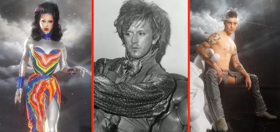
Whatever your entertainment needs, we got your back (and hopefully your mind) with Queerty’s weekly “Culture Club” column with some of the highlights of new releases, streaming shows, classics worth revisiting, and what to drink while you watch.
The Problematic: Dear Evan Hansen
Out actor Ben Platt reprises his star-making stage role in this adaptation of the smash musical, directed by queer director Stephen Chbosky. Dear Evan Hansen follows its titular high schooler (Platt), a nerdy outcast suffering from anxiety and depression. The suicide of a fellow student, Connor (Colton Ryan) accidentally casts Evan into the spotlight, as Connor’s parents (Amy Adams & Danny Pino) dote over their son’s “best friend.” Validated by the adoration, Evan plots with a student hacker (Nik Dodani) to forge emails reinforcing the lie that he and Connor were besties in hopes of getting closer to Connor’s sister Zoe (Kaitlyn Dever), upon whom he has a growing crush.
At first glance, director Chbosky would seem like a perfect fit for this material, having already crafted a masterpiece around similar themes in The Perks of Being a Wallflower. Unfortunately, here, the underlying problems of the material derail his efforts. As a protagonist, Evan’s motives in furthering the lie of his and Connor’s friendship come off as more selfish than noble—he wants attention and a chance to get closer to Zoe, rather than spare Connor’s family pain. That makes him a somewhat loathsome character: we found ourselves rooting against him rather than for him to succeed. In the role he created, Platt has a chance to showcase his soaring vocal range, but has no chemistry with his fellow performers. Slimmed-down, shorn and slathered in heavy make-up (along with rumored CGI de-aging), he does his best to look 17, though no amount of foundation can cover up his thick five o’clock shadow. Platt also plays his character through a series of broad gestures and a shuffling posture, as opposed to his co-stars’ more naturalistic approach. It’s the kind of performance that could be riveting on stage, but doesn’t work in front of a camera.
The movie has other problems too. Evan’s relationship with Dodani’s hacker feels oddly underdeveloped, as do Zoe’s complicated feelings for Connor. Much like Platt’s performance, the shrieking pop tunes by Benj Pasek and Justin Paul would impress in a live setting but sound shrill and overwrought on screen. Evan’s high school appears to be the cleanest, most impossibly sparkling school in the history of education. A revised ending that relies on leaked video from a 12-step meeting not only feels conceited and ridiculous, but also undermines the notion that Evan has done as much good as harm with his lies.
How about we take this to the next level?
Our newsletter is like a refreshing cocktail (or mocktail) of LGBTQ+ entertainment and pop culture, served up with a side of eye-candy.
So why recommend the movie? Fans of the stage version will likely enjoy singing along to their favorite tracks and revel in a couple of standout production numbers. Purists also might forgive Platt’s acting style and aged looks as a means of seeing him recreate his Tony-winning performance on screen. Moreover, the cast & crew roster boasts a litany of outstanding LGBTQ talent: Platt, Chbosky, Pasek, Dodani, Amandla Stenberg. Supporting a big-budget studio movie with so many queer above-the-line talents, especially one in which a gay actor plays a straight lead, will open the door to more major productions helmed by and featuring members of the community in key positions. That may make us sound like we have cynical motives for which questionable means achieve a noble end, but hey, Evan Hansen does the same thing.
In theatres September 24.
The Thriller: Through the Glass Darkly
Queer director Lauren Fash’s debut film finally arrives in theatres and on streaming this week, bringing it’s very gay story of murder and intrigue to a wide audience. Through the Glass Darkly follows Charlie (Robyn Lively), a hard-drinking lesbian grieving over the disappearance of her daughter one year earlier. When another local girl goes missing, Charlie teams with a local journalist (Shanola Hampton of Shameless) to prove a connection between the two abductions, diving into an underworld of political corruption, sexual exploitation and murder.
Lively, hereto best known as an 80s teen queen for her roles in Teen Witch and The Karate Kid Part III, gives a spellbinding performance in the lead. Dressed in frumpy clothes and with haunted eyes that suggest nights of insomnia and raw nerves, Charlie is a character unlike the pretty and perky roles that Lively has played throughout her career. It helps, of course, that she has a talented director to guide her in Lauren Fash, an artist who revels in the grittiness of the movie’s backwoods setting and who knows how to use her camera to create an atmosphere of danger and paranoia. The script, written by Fash and her real-life wife Susan Graham provides more than a few disturbing twists to up the ante on Charlie’s quest. When the ultimate mystery finally uncoils, we’re left wondering just who is the real victim in this story.
Through the Glass Darkly provides thrills and intrigue without Hollywood’s usual cheap tricks of jump scares and special effects. Rather, it gives a veteran actress a chance to shine as never before, and announces a thoughtful, astute queer director on the rise. Through the Glass Darkly furthers the evolution of queer cinema where LGBTQ themes can appear prominent yet incidental, and one well-crafted enough to remind us of how the movies can still entertain with a simple, well-told story.
In select theatres and available on VOD September 24. Readers in Los Angeles can also attend a special premiere screening in North Hollywood featuring a panel discussion with writer/director Fash as well as stars Lively and Hampton, hosted by Queerty’s weirdest looking Entertainment Editor.
The Explosive: Nuclear Family
Director Ry Russo-Young unpacks a tumultuous family history in this documentary series. Russo-Young grew up as the daughter of a lesbian couple, Robin & Russo, in New York in the 1980s. Robin & Russo had given birth to Ry and her sister Cade through surrogacy. Flash forward a few years to when Ry and Cade began school, and began asking about the identity of their fathers. At the urging of Robin & Russo, Tom, Ry’s donor, began a relationship with the girls. Years of letters, visits and family vacations passed by before tensions developed between Tom, Robin & Russo. Then, after an explosive fight, Tom decided to sue for custody of Ry.
Through a combination of new interviews, archive news footage, and home movies, Ry Russo-Young reconstructs the events leading up to the lawsuit that ravaged her family and lefter her horribly traumatized. Yet, as she learns in this new telling of her family drama, there may have been more to the story than she realized as a child. A lot more.
More than that we’ll not reveal here, so as to better preserve several major twists to this story. We will add, however, that Nuclear Family got under our skin in a way few series ever do, leaving us haunted by rage and sadness. This is the kind of story where nobody is wrong, but nobody is right, either. Though we could assign blame for specific choices, we can’t blame anyone for their feelings. By the time an emotionally fraught Russo-Young confronts the question at the center of this series (no, we won’t give it away, either), the true tragedy of this story begins to emerge: that of a beautiful queer family that totally failed its children. And yet, despite that failure, we can’t help but laud the trailblazing gay adults at the center of this story for their courage and spirit to show the world a new kind of family. Much as the development of the atomic bomb ushered in a new era in human history, so did this Nuclear Family signal a new age of LGBTQ parenting. What a shame then, that it had to detonate that bomb on itself.
Premieres September 26 on HBO Max.
The Disturbed: Surge
Ben Whishaw stars in this new British thriller about a man teetering on the edge of sanity. Surge follows Joseph, a friendless TSA agent living a life of almost total isolation, save for a few tortuous visits with his abusive mother and father. Following a particularly nasty exchange with his folks, Joseph has a breakdown, one that sees him breaking rules at work for no reason and robbing banks for thrills. As his descent into madness continues, Joseph’s actions become more and more outrageous…and the happier he seems to get.
While watching Surge, we couldn’t help but think about Joker, the 2020 ultra-violent reimagining of the Batman villain that won Joaquin Phoenix an Academy Award. Both films tell stories of dehumanization and mental illness, and both also feature a leading actor in an all-in, uninhibited performance. Unlike the overrated and overhyped Joker, however, Surge doesn’t try to tie itself to an existing property in the name of financial exploitation. It also features more nuanced characters, a more credible story and a better leading performance. Unlike Joker’s Phoenix (and we do love him) whose performance amounted to histrionic flailing, Whishaw makes Joseph into a credible human being, one stifled by his rigid lifestyle and loveless family. For him, robbing banks and getting bloodied in accidents only makes him feel more alive, masculine and hopeful. In other words, this is the movie Joker wanted to be: an exploration of how an ever more impersonal society robs men of purpose, connection, and identity, and how a crisis can elicit the love we might not otherwise feel.
Surge also reminds viewers that Whishaw, for all his success, remains one of the most underutilized actors alive. The film is a must for his fans, as well as for anyone that looks for a bit of thought and substance amid a story of violence.
In theatres September 24.
The Soloist: Safe Word
Actor Alex Hernandez delivers a monologue by writer JJ Keyes this week as part of The 24 Hour Plays: Viral Monologues. Each performance consists of a monologue written, performed and recorded in less than 24 hours, then uploaded to YouTube. In Safe Word, Hernandez wrestles with his overweight cat and waxes philosophical about having a threesome while on a German vacation. Of course, he also reveals his newfound interest in BDSM whilst donning a leather harness and revealing his newfound love of kink. Good for him, we say.
Streams on YouTube.
The Stirring: VUCA and Usen Isong feat. the Trans Chorus of Los Angeles “Shine”
Artist collective VUCA (Volatility, Uncertainty, Complexity, and Ambiguity) teams with singer Usen Isong and the Trans Chorus of Los Angeles to release this new single as a benefit for Planned Parenthood of Wisconsin. A mix of symphonic grandeur and piano pop, the song tells the story of waking up in the afterlife and warning those left behind on Earth to live and love without fear. That’s the kind of “Shine” we can get behind.
Available on Amazon, Soundhound, Spotify, Apple Music & YouTube.
The Sip: Nuclear Daquiri
In recognition of the disturbing tale of Nuclear Family, we offer up this variation on a cocktail classic. Sweet, sour and strong, it will help steady any nerves left raw by the series, or any of our other selections this week.
- 1 oz Overproof Rum
- .75 oz Green Chartreuse
- .25 oz Velvet Falernum
- 1 oz Lime Juice
Mix ingredients in a cocktail shaker over ice. Shake well. Strain into a glass and serve.



















oaksong
There are, today, plenty of 17 and 18 yo boys who can grow beard. Ben plays the character as it was defined. Apparently some people are not well educated on mental health issues related to autism and aspergers. Critics are often idiots, unfortunately.
failte21
Exactly! Ben plays a great part I felt every emotion, the reviewer obviously didn’t understand his character
roddy
Totally agree with you! It was a good (not great) movie and Ben’s portrayal was excellent as was his singing voice. Totally entertaining. Kinda reminded me of Next to Normal.
QJ201
Dear Evan Hansen looks as bad as The Prom
moretruth
The Prom and Everybody’s Talking About Jamie both felt dated and cringeworthy at times. Like nearly everybody, I thought Evan Hansen was about a gay. It sounds bad, AND has no gay storyline so it won’t be on my list